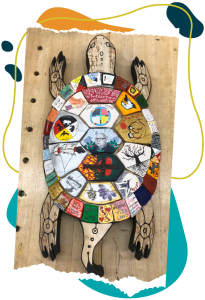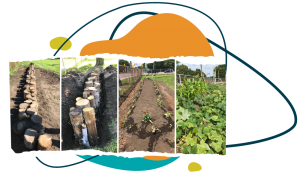Facing History and Ourselves uses lessons of history to challenge teachers and their students to stand up to bigotry and hate

At Facing History and Ourselves, we believe the bigotry and hate that we witness today are the legacy of brutal injustices of the past. Facing our collective history and how it informs our attitudes and behaviours allows us to choose a world of equity and justice. Facing History’s resources address racism, antisemitism, and prejudice at pivotal moments in history; we help students connect choices made in the past to those they will confront in their own lives. Through professional development opportunities, we connect with educators across the country in supporting their work towards creating the next generation of leaders who will build a world based on knowledge and compassion. With a commitment to supporting educators and students during COVID-19, much of our offerings such as webinars, teaching resources and strategies have been adapted for online and hybrid learning.
How does the Facing History approach look & feel in the classroom?
Facing History Canada works with a group of talented, passionate, and committed teacher leaders who are part of a national educator community that centres equity, anti-racism, learning, and collaboration. We had a chance to speak with some of Facing History’s OSSTF/FEESO-member teacher leaders to hear what our approach to education feels and looks like in classrooms, particularly during these challenging times we find ourselves in.
Who you are, what you teach, how you came to Facing History.
I’m Leah Mauer—District 12, Toronto. I teach history, social science, English, ESL, and special education. I’m also an assistant curriculum leader (ACL) in Building Capacity and Supporting Achievement: English/Social Science. I came to Facing History while I was a teacher candidate looking to engage students in difficult conversations. I was introduced to a teacher who was teaching the Genocide and Crimes Against Humanity course, and that teacher brought me to a planning meeting where I met Leora Schaefer, the Executive Director of the Canada office. The rest is history!
My name is Ben Gross—District 12, Toronto. I teach history and social science and am the ACL of Social and Global Studies at my school. I came to Facing History when the CHG3 Genocide and Crimes Against Humanity course was offered at my school and they were recommended as an organization with a great approach and resources.
My name is Jse-Che Lam—District 12, Toronto and I’m an English and history teacher.
What is your ‘why’ for teaching and how does Facing History help support and guide your purpose?
Leah: My why is to help students understand themselves, understand the world, and work to make it better. Facing History helped me combine my passions for history and social justice with their pedagogical framework, so I could help my students become the upstanders I know they
can be.
Ben: My why for teaching is to identify things that are accepted as ‘normal’ but need to be questioned and disrupted. This has resulted in a lot of learning for both myself and my students. Facing History is an organization composed of people who, I believe, share my ‘why.’ The organization supports me in working towards my purpose through professional development, opportunities to meet other like-minded educators, and by providing excellent text and video resources for classrooms that cover challenging topics.
Jse-Che: At the start of the 2020–2021 school year, our school launched the NBE3: Contemporary First Nations, Métis and Inuit Voices course which several Ontario school boards are now teaching in place of the traditional Grade 11 English course. The resources from Facing History have been instrumental in building the framework of this course. As a settler, there is a particular weight of responsibility that I feel towards this course as I want to get it right the first time. I want to ensure that I do not perpetuate stereotypical representations of First Nations, Métis or Inuit peoples.
How do the Facing History curriculum resources invite students to develop the critical analysis skills and mindsets for equity?
Leah: The scope and sequence framework is really helpful for that. All Facing History resources centre around identity, membership, case studies, legacy, and choosing to participate. The scope and sequence also helps me frame my courses with the end in mind, and helps me sort through what’s important to teach in a crowded curriculum and what can be omitted.
The discussion questions, videos, and teaching strategies on Facing History’s website (facinghistory.org) also help engage students and make it easy for me to evaluate what students are getting out of the course.
Ben: Facing History curriculum material invites students to be critical about themselves and their world by offering in-depth resources that you often can’t find in the standard classroom texts. The curation of these resources allows teachers to easily find a place to start developing a more critical understanding of history, both for themselves and their students. This more critical understanding of history is essential in understanding the need for and purpose of equity in all aspects of our society today. It helps students see that the issues of the past are the roots of, and still live on in, the policies and practices of today.
Jse-Che: With the speed of change with which the world is experiencing today, it’s critical that educators prepare students to think critically. It is vital that students know how to examine history and see how it affects them today. It’s necessary for students to see themselves in a position where they show confidence in historical thinking and the role that they play in effecting change. The resources from Facing History have always been useful in breaking down complex issues and for the organization’s statements about how educators can speak to and debrief contentious events with their classes.
Can you share a classroom story with us?
 Ben: Over the past few years, working with Facing History has provided my students with incredible opportunities.
Ben: Over the past few years, working with Facing History has provided my students with incredible opportunities.
In my Grade 12 Equity and Social Justice course, we read Theodore Fontaine’s memoir Broken Circle: The Dark Legacy of Indian Residential Schools and used Facing History resources to engage with Chief Theodore Fontaine’s story and create a piece of art as a class in response. We learned that Chief Fontaine is from the Turtle Clan and so the students decided to design a turtle in collaboration with Alan Colley, who acted as an Indigenous mentor on the project and is the owner and creator of Toronto Aboriginal Eco Tours.
The turtle was cut out of a single piece of wood by our amazing colleague, Dan Kunanec, and the students made pieces of clay to fit the design on the turtle’s back. Each student designed at least one piece of the turtle’s shell, some with incredible pieces of art, others with words that impacted them from Chief Fontaine’s memoir or interviews. Facing History organized a gathering at which Chief Fontaine spoke and the students were able to ask him questions and present him with the turtle as a gift. The turtle now travels with Chief Fontaine when he visits schools and he uses it as a teaching and learning tool. The students learned so much from this process—the truth of the history and legacy of Residential Schools and that their learning and work can have an impact.
Through our connection with Alan Colley, our senior Social Science courses and our Emerging Green Technology courses collaborated to learn about, design, and build Haudenosaunee Mound Gardens. These are incredibly effective sustainable growing systems that outperformed the raised and irrigated garden beds in our Urban Farm—without being watered!
We are so grateful to our Indigenous mentors who have gifted us with seeds to grow corn, beans and squash. As we expand the number of mounds, we have shared our seeds and produce back to our community, to the people who shared with us, and to others with whom we have built relationships. This has been a valuable process for us and our students to learn about the importance of relationship and reciprocity—with other people and with the earth. The students engaged in learning about the impact of colonialism and white supremacy on food sovereignty, how implementing UNDRIP (United Nations Declaration on the Rights of Indigenous Peoples) could help support the return of food sovereignty, and that distinct disciplines like equity studies, sociology, history, and green industries are all deeply connected.
How has Facing History supported your teaching during COVID?
Leah: Facing History’s website has an incredible back to school 2020 section, with lots of tools to help students collaborate online. They’ve put out incredible and timely resources on difficult things that have happened this year—from the murder of George Floyd, to the insurrection at the U.S. capitol, to helping students grapple with their own feelings about COVID. Students are hungry for human interaction and to have a place to wrestle with all the changes that have been occurring in our world. Facing History has made it so much easier for me to engage them in this way.
Ben: The free online resources that Facing History provides are amazing. Access to digital copies of texts, the scholar videos, and the library of teaching strategies were all lifesavers when transitioning back and forth between virtual and in-person—and both at the same time. The continued opportunity to participate in virtual professional learning was also appreciated, especially as someone who has had to attend fewer events in the past couple of years after I moved further away from Toronto.
Thank you Leah, Ben and Jse-Che for sharing your experiences with us.
To learn more about Facing History, explore our website and join our Facing History educator community!

Leave a comment